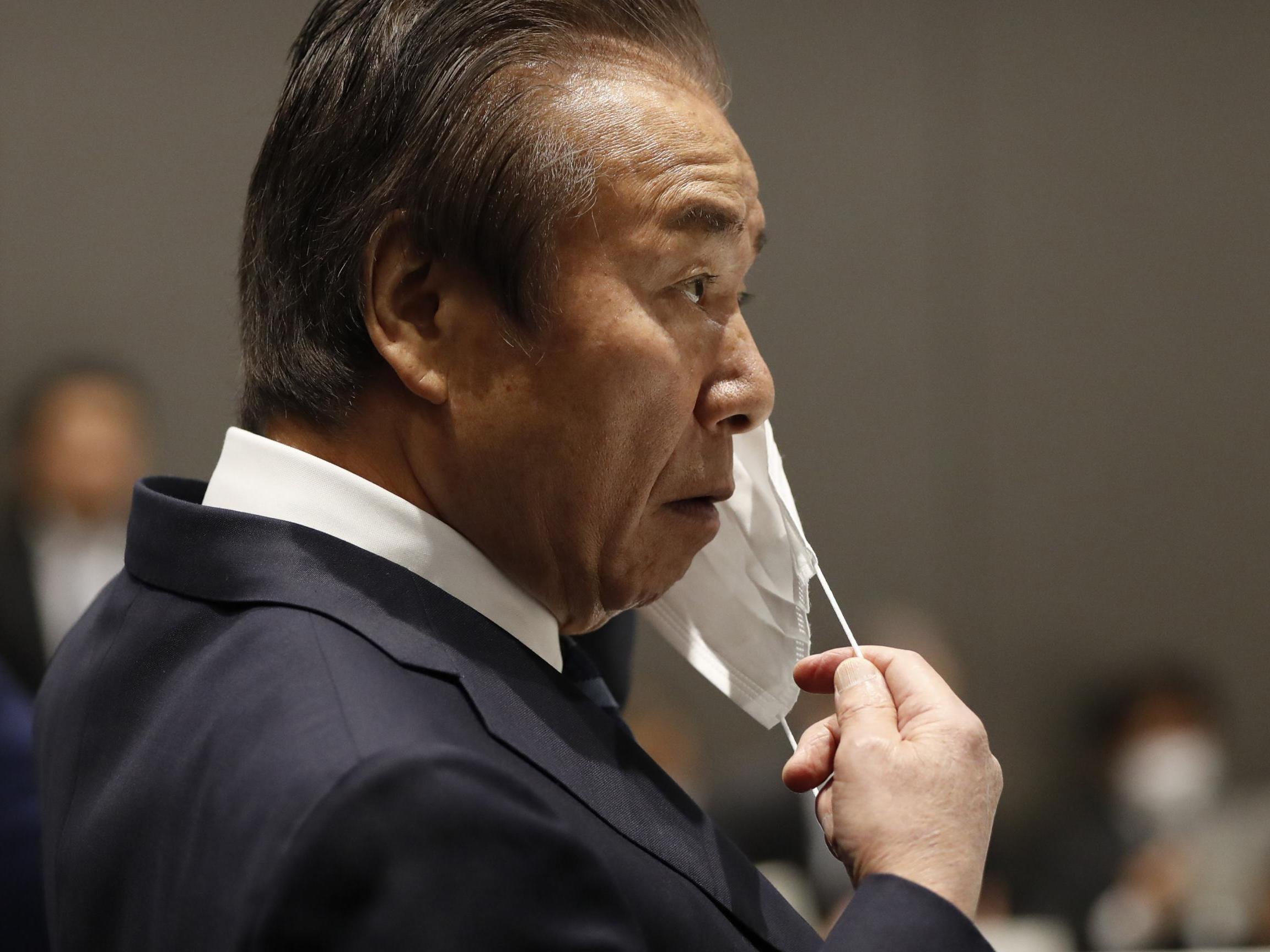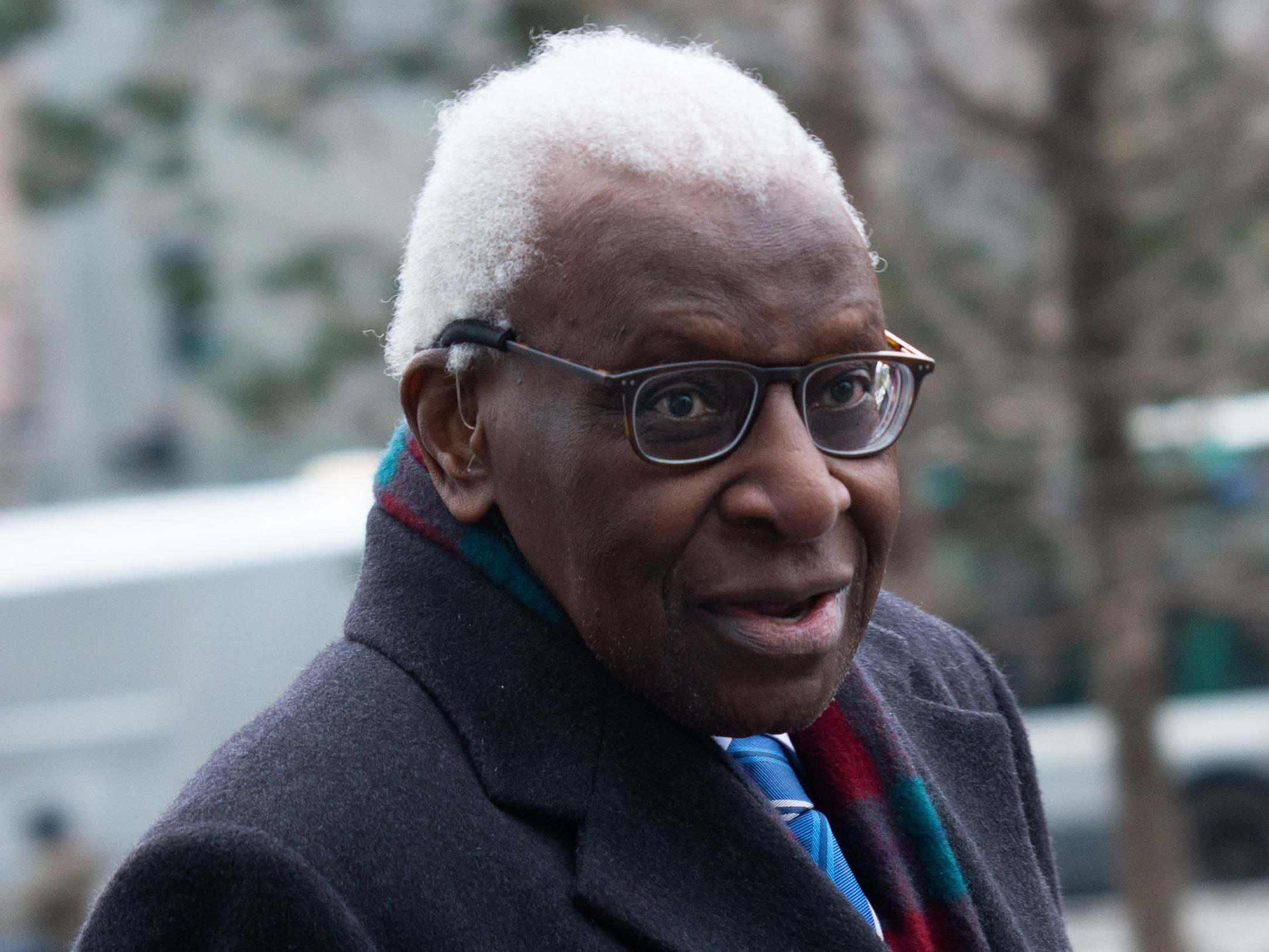2020 Olympics: Japanese businessman paid $8.2m by Tokyo organisers ‘gave gifts’ to Lamine Diack
Haruyuki Takahashi denied any impropriety and claimed ‘you don’t go empty-handed. That’s common sense’

Your support helps us to tell the story
From reproductive rights to climate change to Big Tech, The Independent is on the ground when the story is developing. Whether it's investigating the financials of Elon Musk's pro-Trump PAC or producing our latest documentary, 'The A Word', which shines a light on the American women fighting for reproductive rights, we know how important it is to parse out the facts from the messaging.
At such a critical moment in US history, we need reporters on the ground. Your donation allows us to keep sending journalists to speak to both sides of the story.
The Independent is trusted by Americans across the entire political spectrum. And unlike many other quality news outlets, we choose not to lock Americans out of our reporting and analysis with paywalls. We believe quality journalism should be available to everyone, paid for by those who can afford it.
Your support makes all the difference.A businessman who received millions of dollars for his work on Tokyo’s successful campaign to host the 2020 Olympics, which was postponed last week due to the coronavirus, said he played a key role in securing the support of a former Olympics powerbroker suspected by French prosecutors of taking bribes to help Japan’s bid.
Haruyuki Takahashi, a former executive at the advertising agency Dentsu Inc, was paid $8.2 million by the committee that spearheaded Tokyo’s bid for the 2020 Games, according to financial records reviewed by Reuters. Takahashi said his work included lobbying International Olympic Committee members like Lamine Diack, the ex-Olympics powerbroker, and that he gave Diack gifts, including digital cameras and a Seiko watch. “They’re cheap,” he said.
The payments made Takahashi the single largest recipient of money from the Tokyo bid committee, which was mostly funded by Japanese companies. After his involvement in Tokyo’s successful campaign, Takahashi was named to the board of the Tokyo 2020 organising committee, a group tasked with running the summer Games after it was awarded to Japan.
Takahashi acknowledged receiving the payments but declined to give a full accounting of how he used the money. He said he urged Diack to support the Tokyo bid and denied any impropriety in those dealings. He said it was normal to provide gifts as a way of currying good relations with important officials like Diack. He said there was nothing improper with the payments he received or with the way he used the money.
“You don’t go empty-handed. That’s common sense,” Takahashi said, referring to the gifts he gave Diack.
Banking records from the Tokyo 2020 bid committee, which were examined by Reuters, show it paid around $46,500 to Seiko Watch. A senior official at the bid said “good” watches were handed out at parties organised as part of Tokyo’s campaign to win the Olympics, although he did not specify the brand.
International Olympic Committee (IOC) regulations allowed for the giving of gifts of nominal value at the time of the 2020 bid, but didn’t stipulate a specific amount.
A day before the 2013 vote on the host city, Diack informed a meeting of African Olympic representatives that he planned to support Tokyo on merit, a lawyer for the influential Senegalese sports figure said. But he didn’t instruct anyone how to vote, the lawyer said.
The Tokyo bid committee also paid $1.3 million to a little-known non-profit institute run by former Japanese Prime Minister Yoshiro Mori, a powerful figure in Japanese sports and the head of the Tokyo Olympics organising committee.
The payments to Takahashi’s company and Mori’s non-profit are enumerated in banking records from the Tokyo 2020 bid committee examined by Reuters. The payments were first reported by Japanese magazine Facta. French investigators have not questioned anyone about the payments to the Japanese recipients.
The banking records were provided to French prosecutors by Japan’s government as part of France’s investigation into whether Tokyo’s bid committee paid $2.3 million through a Singaporean consultant to win Diack’s support for Japan to host the 2020 Games.
Diack, 86, has consistently denied any wrongdoing. His lawyer said Diack “denies all allegations of bribery.”

The French are also investigating Diack’s son, Papa Massata Diack, on suspicion that he received the bulk of the money paid to the Singaporean consultant, and passed money on to his father to secure votes for Tokyo. Diack’s son has also denied any wrongdoing and said via email that he would “deliver my version in courts!!!”
Mori did not respond to questions from Reuters. A representative of Mori’s non-profit said the entity was paid by the bid committee to “mainly analyse international information.”
Nobumoto Higuchi, the secretary general of the bid committee, said Takahashi earned commissions on the corporate sponsorships he collected for the bid. “Takahashi has connections,” Higuchi said. “We needed someone who understands the business world.”
The International Olympic Committee said it would not have been made aware of payments between private parties or gifts given to IOC members.
Olympic preparations have cost Japanese taxpayers some $13 billion, and the delay of the Games has rattled corporate sponsors, who had paid a record $3 billion to be affiliated with the Olympics as of June last year.
Mori and Takahashi were central to Tokyo’s bid to win the Olympics, a campaign that began in 2011 and became a national priority under Prime Minister Shinzo Abe. Mori has publicly recounted how he lobbied a key International Olympic Committee official ahead of the vote.
Since 2015, French prosecutors have been investigating Diack, formerly the head of the international body governing track and field. Diack has also been accused of taking a separate $2 million bribe to corral votes for Rio de Janeiro in that city’s successful bid to hold the Olympics in 2016. He has been under house arrest in France since charges of corruption linked to sports doping – when he headed the International Association of Athletics Federations – were brought against him in 2015.

Diack’s lawyer said his client “did not receive any money from anyone relating to the Olympic Games in Tokyo or Rio de Janeiro.”
Tsunekazu Takeda, who headed Tokyo’s bid committee, is also under investigation by the French on suspicion of authorizing the payments from the bid committee to the Singaporean consultant that investigators suspect acted as an intermediary to get money to Diack. Takeda resigned from both the Japanese Olympic Committee and the International Olympic Committee last year and has denied wrongdoing, saying he believed the payments were for legitimate lobbying efforts.
Takeda’s lawyer said he did not instruct Takahashi to lobby Diack and was unaware of any gifts given by Takahashi to Diack. “Mr. Takeda has never approved such things,” the lawyer said.
Abe promised full cooperation with the French investigation, which is part of a long-running probe of corruption in international sports, including the cover-up of doping cases involving Russian athletes.
Privately, Renaud Van Ruymbeke, the French magistrate who led the investigation until June last year, had complained that Japanese prosecutors did not provide all the information the French investigators were seeking, according to internal transcripts related to the probe reviewed by Reuters. The magistrate, the current French judge overseeing the case, and Japan’s justice ministry all declined to comment.
In response to questions, the International Olympic Committee said it supported “the French judicial authorities and needs to respect the confidentiality of the process.” It added that it was “partie civile” to the proceedings, meaning it views itself as a potential victim and could seek compensation.
A 2016 investigation into the payments made by the Tokyo bid committee, which was conducted by a third-party panel convened by the Japanese Olympic Committee (JOC), found no evidence of wrongdoing. The JOC probe was criticized by an outside group of legal and compliance experts for not being thorough enough. The report that resulted from the JOC probe did not examine payments to Takahashi or the Jigoro Kano Memorial International Sport Institute, the non-profit sports institute run by Mori.
The JOC said it was separate from the bid committee and had no knowledge of payments made to Takahashi’s company and Mori’s non-profit.
Asked about the payments, an organizing committee spokesman said the bid committee had been disbanded and the organizing committee was “not in a position to know the details of the bidding activities.”

In a series of interviews with Reuters, Takahashi, 75, described how he became involved in the Tokyo bid. He said he was brought on as a consultant by bid-committee chief Takeda. Takahashi said one of his main assets was the connections he had built to Diack and other powerful figures in international sports during a career developing Dentsu’s sports marketing business.
Takeda’s lawyer said he “knows nothing” about the contract between Takahashi and the bid committee, except for the fact that “a contract on marketing activities existed.”
Takahashi said he was paid through his company, Commons Inc, by the Tokyo bid committee for “wining and dining” people who could further Tokyo’s bid, and for marketing and other activities related to Tokyo’s Olympic campaign.
The payments were in part “a commission fee” for his role in gathering sponsors to fund Tokyo’s bid, he said. “I didn’t pay any money to anybody. This is my profit.”
Takahashi said he asked Diack to support the Tokyo bid, but denied that he paid bribes or did anything wrong. He said he believed Diack wanted to vote for Tokyo because of Takahashi’s support for the International Association of Athletics Federations when Takahashi was a Dentsu executive. The Monaco-based organization, which governs track and field and is now called World Athletics, was run by Diack until 2015.
Asked how he used the payments he received from the Tokyo bid committee, Takahashi said he was under no obligation to detail what he did with the money. “One day before I die, I will tell you,” he said.
The Kano institute headed by Mori, which received $1.3 million from Tokyo’s bid committee, was named after a judo master who spearheaded the ultimately scrapped effort to bring the 1940 Olympics to Tokyo. It has one staff member, Tamie Ohashi.
Ohashi told Reuters the money was used by the institute to hire a U.S.-based consulting firm and two individual consultants to support the Tokyo 2020 bid. She said she didn’t know why the institute, and not the Tokyo bid committee, hired the consultants, and declined to name them.
The institute’s website does not list any activities explicitly linked to the bid. Ohashi also said the institute paid for research that would help Tokyo’s campaign.
Japan’s Deputy Chief Cabinet Secretary, Akihiro Nishimura, said the government could not answer questions about the bid committee’s activities. He said questions about payments to Takahashi and the Kano institute should be directed to the JOC and the Tokyo metropolitan government, because they mainly led the effort.
The Tokyo Metropolitan government did not immediately respond to a request for comment.
Reuters
Join our commenting forum
Join thought-provoking conversations, follow other Independent readers and see their replies
Comments